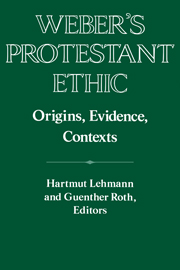Book contents
- Frontmatter
- Introduction
- Part I Background and Context
- Part II Reception and Response
- 10 The Longevity of the Thesis: A Critique of the Critics
- 11 The Use and Abuse of Textual Data
- 12 Biographical Evidence on Predestination, Covenant, and Special Providence
- 13 The Thing that Would Not Die: Notes on Refutation
- 14 Historical Viability, Sociological Significance, and Personal Judgment
- 15 The Historiography of Continental Calvinism
- 16 The Protestant Ethic and the Reality of Capitalism in Colonial America
- 17 The Economic Ethics of the World Religions
- 18 “Meet Me in St. Louis”: Troeltsch and Weber in America
- Index
13 - The Thing that Would Not Die: Notes on Refutation
Published online by Cambridge University Press: 05 January 2013
- Frontmatter
- Introduction
- Part I Background and Context
- Part II Reception and Response
- 10 The Longevity of the Thesis: A Critique of the Critics
- 11 The Use and Abuse of Textual Data
- 12 Biographical Evidence on Predestination, Covenant, and Special Providence
- 13 The Thing that Would Not Die: Notes on Refutation
- 14 Historical Viability, Sociological Significance, and Personal Judgment
- 15 The Historiography of Continental Calvinism
- 16 The Protestant Ethic and the Reality of Capitalism in Colonial America
- 17 The Economic Ethics of the World Religions
- 18 “Meet Me in St. Louis”: Troeltsch and Weber in America
- Index
Summary
The reception of The Protestant Ethic and the Spirit of Capitalism is littered with the corpses of critiques that fell stillborn from the press, dead on arrival because they attacked positions Weber did not hold or otherwise employed arguments irrelevant to his case. One of the virtues of Malcolm MacKinnon's critique of The Protestant Ethic is that it does not fall into these perennial errors. Concerning his critique and the project of refuting Weber's account of the relationship between the Protestant ethic and the spirit of capitalism, I would like to make two points.
Weber developed two analyses that tie the Protestant ethic to the spirit of capitalism: the first in the two Protestant Ethic essays of 1904- 1905, the second in his series of essays on American Protestant sects. What is the relation between The Protestant Ethic and Weber's subsequent essays on the Protestant sects? What is the relation between The Protestant Ethic and Weber’s subsequent essays on the Protestant sects?
Weber's argument in The Protestant Ethic may be sketched as follows. According to the Calvinist doctrine of predestination, God has chosen a small segment of the human race as recipients of His grace. These He has selected for salvation. The rest He has chosen to damn. Because of the abyss that separates the transcendence of God from the wretchedness of the human sinner, the unalterable decretum horrible is ultimately unintelligible to the human understanding and incomprehensible from the standpoint of human conceptions of justice.
- Type
- Chapter
- Information
- Weber's Protestant EthicOrigins, Evidence, Contexts, pp. 285 - 294Publisher: Cambridge University PressPrint publication year: 1993
- 3
- Cited by



